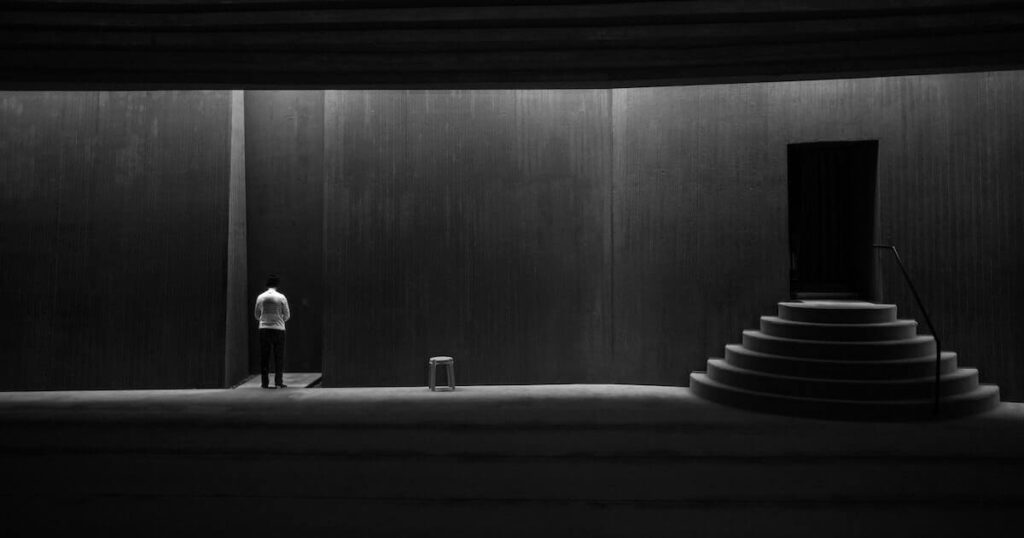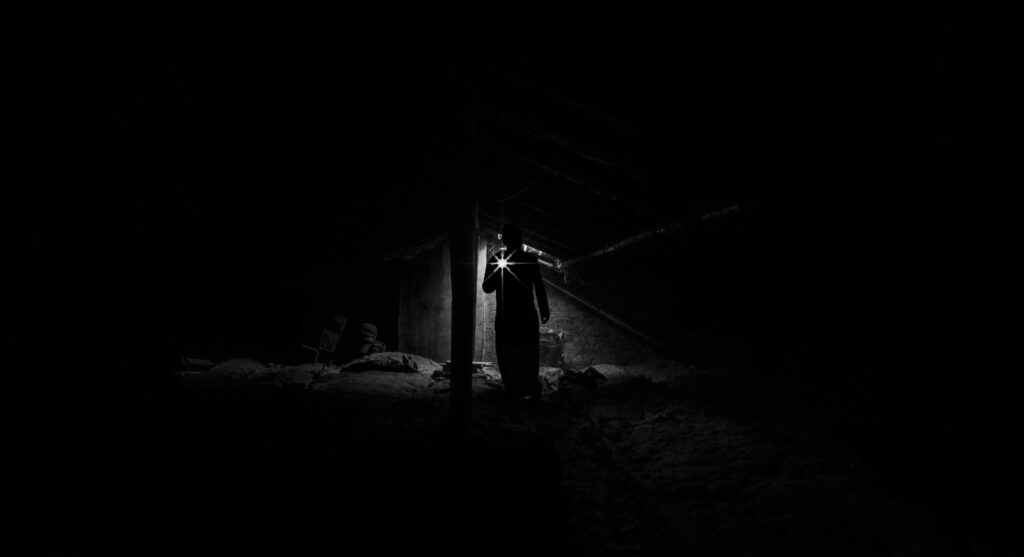Imagine waiting for someone you do not know?
Step into a barren, desolate landscape with two characters, Vladimir and Estragon, as they wait for someone who never arrives. But this isn’t your typical waiting game – this is Waiting for Godot, a tragicomedy that delves deep into the human condition, leaving audiences pondering the meaning of existence long after the curtains have closed. Get ready for a journey through time, memory, and the nature of our very being, as you read the summary of Waiting for Godot take a closer look at the iconic play by Samuel Beckett.

The play is set on a barren plain with only a tree and a single rock as props. Vladimir and Estragon enter the stage, discussing their situation and how they are waiting for someone named Godot, who they do not know and cannot describe. They pass the time with idle conversation, jokes, and physical comedy, trying to alleviate their boredom and anxiety. Throughout the play, they meet two other characters: Pozzo, a pompous and abusive landowner, and Lucky, his mistreated servant. These characters provide brief moments of distraction, but ultimately they leave and Vladimir and Estragon are left alone again, waiting for Godot.
Waiting For Godot Characters
The play Waiting for Godot has a cast of four characters, each unique in their own way. The main protagonists are Vladimir and Estragon, two bumbling, quirky characters who pass the time with idle chatter, jokes, and physical comedy. Vladimir is more intellectual and contemplative, while Estragon is more impulsive and carefree, creating a dynamic and entertaining duo.
The other two characters are Pozzo and Lucky, who provide a stark contrast to Vladimir and Estragon’s relationship. Pozzo is a domineering and pompous landowner who treats his servant, Lucky, with contempt. Lucky, on the other hand, is a tragic character who has lost his ability to communicate and is subjected to cruel treatment by Pozzo.
While the characters may seem superficially comical, they are actually complex and multifaceted, reflecting the existentialist themes of the play. Each character grapples with the weight of existence, with their own unique struggles and challenges.
Overall, the characters of Waiting for Godot are both entertaining and thought-provoking, offering a fascinating glimpse into the human psyche and the human condition.
Discuss The Themes of Waiting For Godot
The play is known for its ambiguity and open-endedness, leaving much up to interpretation. Some see it as a commentary on the human condition, with the characters representing humanity’s struggle to find meaning and purpose in a world that is ultimately meaningless. The play also touches on themes of time, memory, and the nature of existence itself. The characters’ inability to remember certain events or even their own past contributes to the sense of confusion and uncertainty throughout the play.
Waiting for Godot, a play by Samuel Beckett, is known for its deeply philosophical themes that challenge our understanding of existence. The play follows two characters, Vladimir and Estragon, as they wait for someone named Godot who never arrives.
One of the main themes of the play is the futility of existence. Vladimir and Estragon’s endless waiting for Godot represents the human struggle to find meaning and purpose in life, highlighting the idea that perhaps our existence is ultimately meaningless.
The play also explores the concept of time and memory. Vladimir and Estragon can’t remember what happened the day before and are unable to distinguish between the past and the present, giving the impression that time is cyclical and endless.
Another key theme of Waiting for Godot is the nature of human relationships. The characters’ interactions with each other are often fraught with tension, highlighting the difficulty of connecting with others in a world that can seem hostile and meaningless.
Finally, the play touches on the idea of the human condition, specifically the experience of suffering. Through the characters’ struggles and hardships, the play suggests that suffering is an integral part of the human experience, and that perhaps the only way to find meaning in life is to accept this fact and find comfort in the company of others.
Overall, Waiting for Godot is a thought-provoking play that challenges our assumptions about existence, time, memory, and human relationships. Its themes are complex and open to interpretation, making it a fascinating work of literature that continues to captivate audiences today.
Waiting For Godot As An Absurd Play | Summary of Waiting For Godot
Waiting for Godot is not your typical play. It’s an absurd one, filled with strange characters, weird situations, and philosophical musings that will leave you scratching your head. But don’t let that scare you off! This play is a classic for a reason, and it’s well worth your time.
The play revolves around two characters, Vladimir and Estragon, who are waiting for someone named Godot. The catch? They don’t know who Godot is, why they’re waiting for him, or even if he exists. To make things even more absurd, they’re stuck in a barren wasteland with nothing to do but wait. The play is filled with long, meandering conversations, physical comedy, and bizarre moments that will make you laugh, scratch your head, and maybe even shed a tear.

At its core, Waiting for Godot is a commentary on the human condition. It explores the fundamental questions of existence: Who are we? Why are we here? What is the meaning of life? But it does so in a way that is anything but straightforward. The play is intentionally confusing, nonsensical, and at times, frustrating. But that’s the point. It’s meant to make you think, to challenge your assumptions, and to push you out of your comfort zone.
In short, Waiting for Godot is an absurd masterpiece. It’s a play that defies easy categorization, that challenges its audience, and that will stay with you long after you’ve left the theater. So, if you’re in the mood for something different, something strange, and something unforgettable, give Waiting for Godot a try. You won’t be disappointed!
Existentialism In Waiting For Godot
Existentialism is the philosophical movement that argues that individuals create the meaning and essence of their own lives. Waiting for Godot by Samuel Beckett is a prime example of existentialist literature. In the play, the characters are faced with the absurdity of existence as they wait for someone who never arrives, and are forced to confront the lack of meaning in their lives.

Vladimir and Estragon’s constant waiting for Godot represents the human search for purpose and meaning. They are faced with the realization that their existence is meaningless, and struggle to find any purpose in waiting for someone who may never come. The play also touches on the idea of free will, as the characters are free to choose their actions but are ultimately bound by their circumstances.
The play’s absurdist style and lack of traditional plot structure reflect the existentialist belief that life is inherently meaningless and that individuals must create their own meaning. The characters are unable to escape their situation or find any answers, reflecting the idea that individuals are ultimately alone in their search for meaning.
Waiting for Godot highlights the human struggle to find purpose and meaning in a world that is ultimately absurd and meaningless. It forces the audience to confront the questions of existence and the human condition, making it a powerful work of existentialist literature that continues to captivate audiences today.
1. What are the major themes of Waiting For Godot?
The major themes of Waiting for Godot include existentialism, the search for meaning and purpose in life, the absurdity of human existence, the nature of time, and the importance of human relationships.
2. Who are the protagonists of Waiting For Godot?
The protagonists of Waiting for Godot are two characters named Vladimir and Estragon.
3. Who becomes dumb in the play Waiting For Godot?
In Waiting for Godot, Lucky is the character who becomes dumb. He is initially introduced as a servant of Pozzo and is portrayed as being quite talkative and knowledgeable. However, in the second act of the play, Pozzo orders Lucky to “think” and subsequently he becomes mute and is unable to communicate.
4. Who is Godot in Waiting For Godot?
In Waiting for Godot, Godot is a character who is frequently mentioned, but never appears in the play. The true identity and nature of Godot is left ambiguous, and the characters themselves are uncertain about who or what Godot represents.
5. Why is Waiting for Godot an absurd play?
Waiting for Godot is an absurd play because it features illogical and nonsensical situations, meaningless and repetitive dialogue, and a lack of traditional plot structure. The play’s focus on the human condition and the search for meaning in an inherently meaningless world adds to its absurdity.
6. What is the philosophy that backbones Waiting For Godot?
Existentialism is the philosophy that underpins Waiting for Godot. The play explores the existentialist themes of the search for meaning and purpose in life, the absurdity of human existence, and the importance of human relationships.
Also, read about Things Fall Apart, Tonight I Can Write As An Elegy, Things Fall Apart As a Postcolonial Novel, and A Far Cry From Africa Summary and Analysis